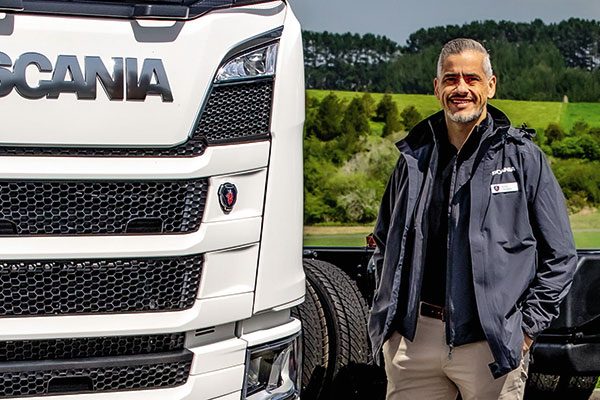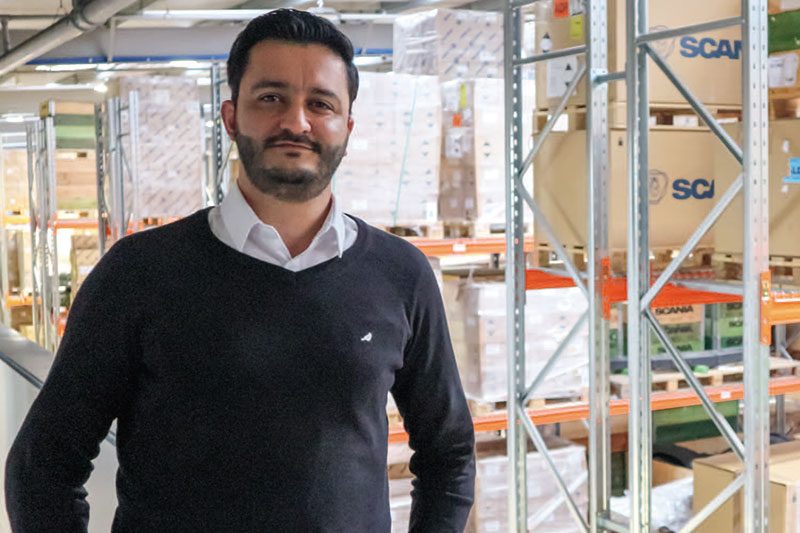
Thousands have trusted their livelihoods – and probably lives – to the Ringfeder brand over the decades. We were lucky to nab VBG Group commercial director Niko Verstockt, recently in New Zealand on a whirlwind visit, for a relaxed and chatty 20 minutes.
He’s your typical tall, immaculate, well-educated European business figure, but like so many from his neck of the woods, Niko Verstockt welcomes a low-key and jovial chat. Fifty-eight year old Niko is VBG Group’s commercial director, and he was in our neck of the woods to celebrate the brand’s 100 years in existence and launch its latest and greatest coupling.
“I’ve not done much travelling for the past two years, as you can imagine. In fact, this is my first big trip since Covid. I’ve been on the road since 1 July, and it’s now mid-July. The European airports are very stressed, but everyone here is far more accepting of the delays – and just calm.”
Niko has spent the past 17 years with VBG Group but began his journey at Iveco, spending seven years at the company after gaining tertiary qualifications in Holland, majoring in truck-specific industrial automotive. From there, it was another seven years at commercial vehicle transport solutions giant HYVA Group, working in the loader crane division, before coming to VBG Group.
“I live in Belgium. I’m Belgian by birth. Our head office is in Vänersborg, Sweden, our international commercial office and R&D is in Krefeld, Germany, and I am also responsible for the international warehouse in Beringen, near my home in Belgium.
“It’s an interesting time in history to be involved. When I started, there wasn’t the international sense and feel there is now. The world has become a village, and I see similar strategies and developments everywhere I go.”
100 years in business
In 1922, an engineer named Ernst Kressig, working at Waggonfabrik AG, developed a spring consisting of rings, which the company patented. In fact, the name Ringfeder translates to exactly that, with ‘ring’ meaning ring and ‘feder’, spring – therefore, ‘ring spring’.
Back then, R&D work was all about railway wagon buffers – trucks towing trailers weren’t really a ‘thing’. Of course, the next logical step for someone dealing with the wagon’s buffers, were the couplers, and the rest as they say… By the time trucks boomed, Ringfeder was well in the coupling game.
Coupling in the broader sense expanded also, and it eventually supplied all manner of solutions, not just in transport but also in general industry – “anywhere a driving unit needed coupling to a driven unit with the need to eliminate vibration and shock – windmills, generators etc”.
In 1997 Ringfeder was bought out by rival VBG Group. “It was truly a case of the midget buying the giant, but they had money to spend, so bought Ringfeder.
“VBG was concentrated on the Nordic, Scandinavian, and UK markets – it still is in many ways. It is the market leader in those regions.
“The company has three divisions: Industrial Couplings, MCC or Mobile Climate Control, and VBG Truck Equipment. MCC manufactures HVAC units with significant market share in the United States school-bus and military industries, as well as contracts with Volvo Group.
“We say that VBG Truck Equipment takes care of everything between the chassis of the towing vehicle and the chassis of the towed vehicle.
“Having said that, our automatic snow chains are gaining huge popularity in Northern Europe and America, especially the school-bus market.”
At this point, it’s worth a quick look at automatic snow chains. A horizontal wheel with eight short chains engages with the drive wheel, deploying the snow chains via centrifugal force beneath the drive wheels.”
“It’s a really great system that does not require anyone to leave the cab. I’m surprised they’re not a standard fit in places like the ones mentioned above.”
What’s new?
“The other reason I am here is the ongoing launch of the new couplers – in particular, for New Zealand, the NZ 50 BNZ MSD, with B designating long handle for this market; NZ is obvious, and MSD, manual safety device. New Zealand and Australia are the only markets in the world with the manual second-safety device being the little wheel that seats and must be pulled out to lift the handle.
“There’s nothing worse than crawling deep under the rear of the truck with rain and mud dripping down your shirt. On the new coupler, the second safety is a kind of flip switch located on the same side as the handle. It’s still a two-stage process but one you can do with one hand – just flick the safety and pull the handle. It’s also maintenance-free.”
“We are also aware of more and more female drivers coming to the industry, so with no disrespect at all, we have to try and reduce the heavy, physically demanding tasks.”
The NZ 50 BNZ MSD has been through a two-year field-test programme here and in Australia.
“We were enthusiastic about our original prototype, but drivers not so much. So we went back and made alterations until they all gave us a tick.
“It’s a completely redesigned product. The top bushing is redesigned, and on the bottom, a completely new spring design with only two bolts for taking off the mount. The springs themselves are a cassette arrangement. Plus, the spring works negative, so it gets smaller in jack-knife situations, making it harder for stones to get caught.
“Also, the mouth [guiding funnel] is stronger and can be replaced without taking the top and bottom bushes apart.”
Here and there – global differences
“New Zealand’s big difference is the truck and trailer dominance, with some units having long drawbars, whereas most other markets run centre-axle trailers [semi trailers].
“You have big noses and cabins and lots of axles. Your truck and trailer tippers jack-knife also, and that all requires a stronger coupling.
“New Zealand also has so many brands – Japanese, European, and American. We’ve been very focused on the European brands, and that needs to change, in my opinion. Oceania is the biggest international market for us outside of Europe.
“Also, gravel roads and roads that are much rougher. The product must be much stronger.”
Our D-value has been increased from 200 to 320 for all applications and uses.” (D-value is a performance-value measure of a product’s suitability to an application.)
“Friends and family are always jealous with my travelling. But I say I only see industrial areas, workshops, and the underneath of trucks. But driving around New Zealand is very peaceful and clean. It’s a nice environment to do your job.”

• Dust seal and dam specific to New Zealand continues
• D-Value has been upgraded from 200kN to 320kN. Increased D-Value does not mean the coupling is necessarily stronger or last longer. It measures suitability to application
• Maintenance free manual secondary lock. Zero greasing required
• Lighter by 2.6kg than previous 5050BNZ model
• New upgraded and reinforced guide funnel with easy serviceability. Funnel can be replaced without taking the top and bottom bushes apart
• Solid handle is replaced with tubed
• 40mm coupling with have similar manual secondary lock and guiding funnel benefits
Read more
People and purpose
0 Comments14 Minutes
A new normal
0 Comments9 Minutes
Hurdles and roadblocks
0 Comments5 Minutes





